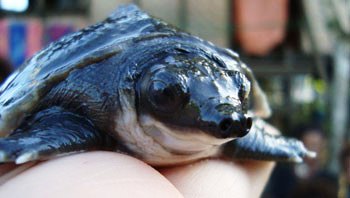Protecting Piku
 Piku is the name given to the pig-nosed turtle by the people of the Kikori Delta of PNG. This species is only found in the southern rivers of the island of New Guinea (Papua New Guinea and West Papua) and the main rivers of Australia’s Northern Territory.
Piku is the name given to the pig-nosed turtle by the people of the Kikori Delta of PNG. This species is only found in the southern rivers of the island of New Guinea (Papua New Guinea and West Papua) and the main rivers of Australia’s Northern Territory.
The pig-nosed turtle or carettochelys insculpta is distinctive due to its snout-like nose. It is of scientific interest because it is the last remaining species of a once widespread family of turtles. To the people of the Kikori, the turtle is prized for its meat and eggs, which represent a great source of protein.
The Piku has been in dramatic decline during the past two decades as a result of growth in human populations and the increased number of villages establishing on riverbanks. This has led to over-harvesting of turtles and eggs.
In 2013, we partnered with the University of Canberra to fund the Piku Conservation Project with the aim to raise awareness and facilitate education about the unique species. The project is focused on researching the nesting biology of Piku, sharing knowledge, building awareness and local capacity, and supporting community-led conservation initiatives in the Kikori Delta.
Field officer and master's student, Yolarnie Amepou, has been stationed in Kikori to help deliver these initiatives. Yolarnie has been involved in the training of 14 local field assistants to monitor the nesting sites, measure the turtles and engage with the community.
To help educate school children, three Piku-specific children’s books were developed and over 15,000 copies have been distributed to schools in Kikori. In support of this initiative, a three-day environmental education training workshop was conducted with teachers to raise awareness on biodiversity and conservation, invasive species and how to use the children’s book most effectively.
To support our education efforts, we collaborated with the Research Conservation Foundation who are focused on environmental education in Papua New Guinea, to ensure our materials are effective.
Yolarnie is passionate about the Piku conservation efforts and believes that for the information to be meaningful, communication must be effective and the core message of conservation needs to be understood.
Preliminary findings point to an increase of Piku sightings in the protected areas, indicating progress and success is being achieved as a result of the conservation program.